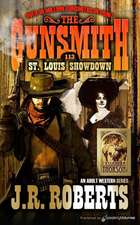Winnetou, the Chief of the Apache
Autor Karl Mayen Limba Engleză Hardback – 3 aug 2015
| Toate formatele și edițiile | Preț | Express |
|---|---|---|
| Paperback (1) | 275.51 lei 6-8 săpt. | |
| CTPDC Publishing Limited – 10 oct 2014 | 275.51 lei 6-8 săpt. | |
| Hardback (1) | 375.26 lei 6-8 săpt. | |
| CTPDC Publishing Limited – 3 aug 2015 | 375.26 lei 6-8 săpt. |
Preț: 375.26 lei
Nou
Puncte Express: 563
Preț estimativ în valută:
71.81€ • 75.12$ • 59.65£
71.81€ • 75.12$ • 59.65£
Carte tipărită la comandă
Livrare economică 02-16 aprilie
Preluare comenzi: 021 569.72.76
Specificații
ISBN-13: 9781910472163
ISBN-10: 1910472166
Pagini: 874
Dimensiuni: 132 x 209 x 54 mm
Greutate: 1.07 kg
Editura: CTPDC Publishing Limited
ISBN-10: 1910472166
Pagini: 874
Dimensiuni: 132 x 209 x 54 mm
Greutate: 1.07 kg
Editura: CTPDC Publishing Limited
Notă biografică
Karl May (1843-1912) is probably still the most read German author in Germany and some other countries. He was born in a large, poor family. After some rather turbulent years, he started to write adventure stories for the youth, although as his popularity increased, more and more adults read his books. The style of his books is the style of the village story tellers. There are improbable adventures, there is no constraint on the soaring fantasy, yet while reading them one can visualise the situation. His Westerns are probably the most read: Winnetou, The Treasure of Silver Lake, The Son of Bear Hunter, The Spirit of Llano Estacado, and The Oil Prince. Much of the ethnographic and some of the geographic details are erroneous in these books, partly because May had never been to the West, partly because these errors helped him develop the story. May's stories are read for the adventure, and for some of the moral values which are prominent in his books. This appeal in particular to the youth: there are no moral ambiguities there: the good and evil struggle, and the good always wins, while the reader cannot be sympathetic to those who represent the evil. May's books were already edited in his life time, but especially after 1913. Over the decades some of May's errors have been corrected by his publishers, and the remarks or contexts that could raise uncomfortable associations have either been removed or rephrased.














